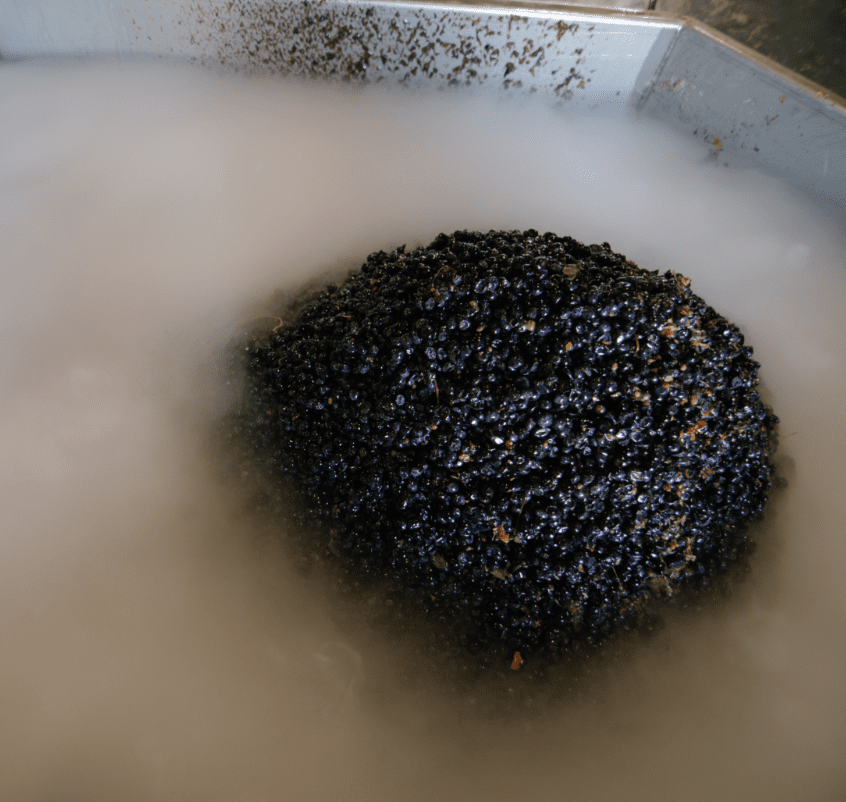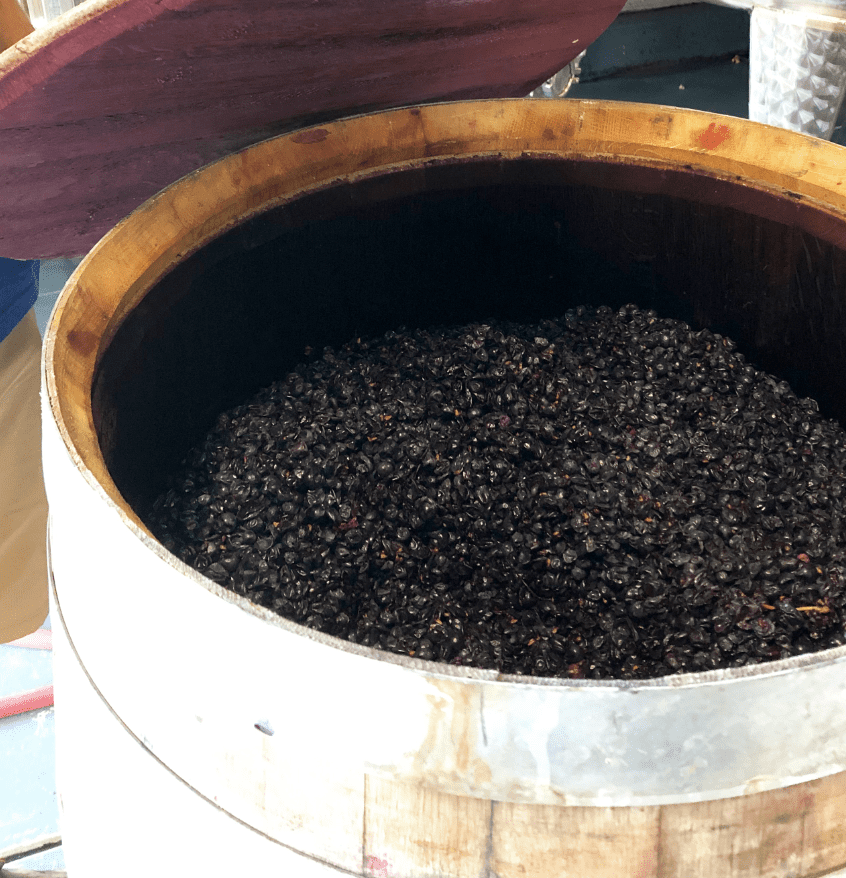suitability of decomposed granite for viticulture
wise villa vineyard
wise villa estate grapes
Wise Villa’s wines come from our estate grapes, meaning they are grown right here on the vines surrounding the winery. Nothing at Wise Villa happens by accident, and the Estate Vineyards are a perfect example. When Owner and Founder Dr. Grover C. Lee decided to plant a vineyard, he searched and researched until he found a location that would have the perfect micro-climate and soils for the wines of distinction he wanted to create.
loam & decomposed granite
The Estate Vineyards lie upon rolling hills of loam and decomposed granite that provide excellent drainage all the way down to the clay hardpan deep below. The deep, well-drained soils are perfect for viticulture, forcing the vines to send roots far and wide to obtain water and nutrients, resulting in a vine with a very strong root system.
Many farmers are mystified by the suitability of decomposed granite for viticulture, but the answer is simple. While most crops do best on rich soils, resulting in large crops, winegrowing is the opposite. The goal in winegrape growing is to produce a small amount of grapes of intense flavor, with low crop levels. Soils that are well-drained and more challenging are in fact the perfect soil for grapevines; in fact, most of the great vineyards of France are on gravel soils, limestone soils, rocky soils, or decomposed granite!
perfect micro-climates
The micro-climates of Wise Villa’s Vineyards set it apart from the surrounding areas as well. The Estate Vineyards lie in an inversion layer, wherein the winter temperatures are warmer (avoiding freezes and spring frosts) and the summer temperatures are cooler (resulting in slower sugar accumulation in the grapes, obtaining richer flavors). Again, the point is not to produce large crops of sweet grapes, but to slow the sugar accumulation so that complex and rich flavors can develop in the grapes without too much sweetness. Wise Villa’s grapes are complex and rich, with low sugars resulting in low alcohols, and a nice acid balance to ensure that the wines will pair nicely with food.
35 acres & 12 varieties
The Estate Vineyards consist of 35 acres planted to 12 different varieties, including Cabernet Sauvignon, Merlot, Petite Sirah, Syrah, Tempranillo, Touriga National, Sangiovese, Zinfandel, Pinot Noir, Pinot Gris, and Chardonnay. Each variety constitutes a section of the vineyard from 1 to 4 acres large, each with its own microclimate.
For example, the Pinot Noir is planted on the Northern hills of our vineyards, where the angle of the sun results in less direct sunlight and lower temperatures, producing finer flavors for this cooler-weather variety. Our Zinfandel is on Southern slopes, as it favors more sunlight and warmth. Care and forethought were taken with each planting.
paying close attention
By paying close attention to our vines, we ensure that they are in pristine condition, producing only the finest grapes. We prune the vines carefully once in early winter and again at the end of winter, keeping the vines in balance, and shoot and cluster thin during spring to ensure that we keep the vines in balance and harvest only 2-3 tons of grapes per acre. For comparison, many valley vineyards crop up to 20 tons per acre. Our low crop levels in our vineyards focus the vines’ energies into fewer grapes, so that the grapes we do harvest are of the highest intensity and quality.
From beginning to end, with forethought, care, and passion we strive to ensure that the wine in your glass is the result of the highest quality grapes, winemaking, and artistry.
HARVEST AND FERMENTATION PROCESS
The Wise Villa grape harvest and fermentation process is different than most harvest and fermentation procedures used around the world. Our grape picking process is meticulously done by hand with our own employees. We do not use outside picking-crews, it is not about speed or a financial decision. This decision, and every decision from the vine to the bottle, is all about quality. Before the picking process, our employees perform a series of tasks not seen in most California vineyards, such as clipping the wing branch from each bundle of grapes, multiple grape thinning, multiple grape sorting, leaf pulling and more. Before a bucket of grapes are dumped into the field ½ ton bin, additional employees will be catching and sorting the grapes again as they go into the bin.
Grape tonnage in California averages from 7 to 30 tons per acre in the Central Valley, and from 4 to 10 tons in most other regions. Our tonnage averages about 3.5 to 4 tons per acre. Our employee picking is used to assure that only perfectly ripe clusters of grapes (and only grapes) are sorted and picked. Our picking starts at 3AM to assure cooler temperatures that will retain the peak of the grape chemistry, such as the natural grape acidity. No picking is allowed past 8 AM. A forklift will pick up the field bin and bring it into the winery, then tip the bin into a stainless-steel hopper and escalator. Two employees will be at the hopper catching and sorting the grapes again before the grapes go into the hopper or up the escalator. The grape clusters go up the escalator and into a de-stemming and crushing machine, the stems are paddled out and the grapes are positioned to be crushed, except, we do not crush our grapes for all of our red wines and some of our white wines. This is quite different. Whole grapes are now ready for the fermentation process.
FERMENTATION PROCESS
The Wise Villa Winery fermentation process for most of our red wines starts with a cold soak and fermentation with whole berries at cold temperatures, to achieve a partial carbonic maceration and maximize fruit-forward aromatic expression. (The retention of small volatile molecules called esters, which are the essence of fruit aromatics).
These techniques result in a vibrant fruit profile and lighter tannins. After fermentation, most of our red wines are left on the skins for an extended maceration to ensure full extraction of flavor and soft tannins from the skins before pressing and being transferred to oak on 100% full lees. This mix of techniques allows the maximum expression of fruit, spice, and lees aromas to produce an intense wine displaying the best qualities of these grapes and vineyards.


Our extremely clean picking and sorting process, eliminating extemporaneous garbage material from the grape bundles, is essential to our wine making process. Many wineries use machine harvesting or outside picking crews which are used for efficiencies such as increased tonnage, and reduced labor cost. One downside though might be a little more garbage material in the picking bens. Garbage material may include such things as: rodents, lizards, snakes, spiders, insects, branches, leaves and grapes.
The amount of garbage does have an influence on sulfite requirements. An exceptionally clean (grapes only) and cold ferment material requires less sulfite protection. The normal range of free sulfite for a normal hot fermentation with a normal amount of vineyard garbage in the ferment is approximately 35 – 45ppm (with a ph of 3.3,3.4 to 3.6,3.7). This should equate to an approximate 0.8 molecular sulfite level which is the standard for a normal fermentation.
Organic winemakers know well the need for a clean ferment if no sulfites are added. Organic wines of quality have no added sulfites and have a quality wine life of 3 to 5 years if the wines are stored with the proper temperature and humidity. Fluctuation in temperature is extremely deleterious to wines as well as constant or fluctuation of temperatures above 70-75%. Humidity should also be maintained at a constant of above 65%-75%. If these conditions of temperature and humidity are not constant and at appropriate ranges, wines will quickly go bad with or without added sulfites.
Wise Villa Winery uses organic principles in our vineyards and is certified sustainable farming by the State of California. We utilize the best of organic farming and organic wine making principles. Our goal is to make the highest quality wines with the least amount of sulfites but assuring that we use exactly the amount of sulfites we need for wine protection and quality. Sulfite levels at or near 0.8 molecular is our standard.

There are four wine making goals specifically planned for our wines

Lower Sulfites

Fresh Fruit Varietal Character

Softer Tannins

Lower Alcohol Levels
These four goals for our wines are specifically done to protect our consumers from headaches through lower sulfites and lower alcohol levels, enhance their wine and food appreciation with lower alcohol and higher natural grape acidity, and to provide the true fruit characteristics of each unique grape varietal.
BOTTLING PROCESS
Using our fully automated Bottling line
In preparation for bottling, our wines are checked and rechecked for appropriate chemistry by our laboratory and a final check by an approved licensed wine laboratory. Our Cross-Flow filtration is designed to maintain the ultimate in wine protection from any organisms with a micron filtration of 0.2 (Cross Flow made by VA Filtration model #CF8-4-400SA). Wines are also bottled on average at a 3.5 PH with 35-40ppm free SO2.
Before the wine is bottled it goes through final finishing filtration step, passing through a .5µm bevgard filter and two .45µm filters. This final step ensures that the wine will be free of any biological contamination.
We gas each tank with Argon to protect the wine from oxygen up take while its being processed for bottling. We use Nitrogen gas during bottling if the lines need to be pushed and the bottles are sparged with nitrogen before they are filled and again to level the volume in bottle. Our bottling line also maintains a blanket of Nitrogen in the filler bowl to protect the wine. We use a fully automated bottling line made by GAI (model number 1001W).





